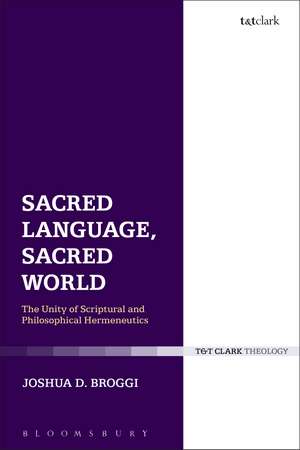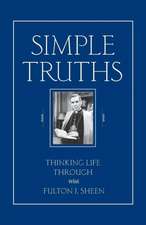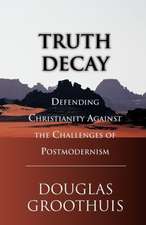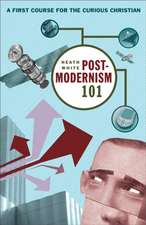Sacred Language, Sacred World: The Unity of Scriptural and Philosophical Hermeneutics
Autor Dr Joshua D. Broggien Limba Engleză Paperback – 25 iul 2018
| Toate formatele și edițiile | Preț | Express |
|---|---|---|
| Paperback (1) | 237.10 lei 6-8 săpt. | |
| Bloomsbury Publishing – 25 iul 2018 | 237.10 lei 6-8 săpt. | |
| Hardback (1) | 773.45 lei 6-8 săpt. | |
| Bloomsbury Publishing – 16 dec 2015 | 773.45 lei 6-8 săpt. |
Preț: 237.10 lei
Preț vechi: 305.41 lei
-22% Nou
Puncte Express: 356
Preț estimativ în valută:
45.38€ • 46.87$ • 37.76£
45.38€ • 46.87$ • 37.76£
Carte tipărită la comandă
Livrare economică 25 martie-08 aprilie
Preluare comenzi: 021 569.72.76
Specificații
ISBN-13: 9780567683656
ISBN-10: 0567683656
Pagini: 232
Dimensiuni: 156 x 234 x 20 mm
Greutate: 0.33 kg
Ediția:NIPPOD
Editura: Bloomsbury Publishing
Colecția T&T Clark
Locul publicării:London, United Kingdom
ISBN-10: 0567683656
Pagini: 232
Dimensiuni: 156 x 234 x 20 mm
Greutate: 0.33 kg
Ediția:NIPPOD
Editura: Bloomsbury Publishing
Colecția T&T Clark
Locul publicării:London, United Kingdom
Caracteristici
Introduces theology students and scholars to the two central texts of 20th-century philosophical hermeneutics and explicates the theological significance of both
Notă biografică
Joshua D. Broggi is a Junior Research Fellow at Wolfson College and a member of the Faculty of Theology and Religion at the University of Oxford, UK.
Cuprins
AbbreviationsIntroduction 1. How to Read this Book 2. Narrative and World 3. A Tale of InterpretationsPart I: Heidegger1. Being and Time The Very Possibility of Reading Scripture Wrongly What Sort of Book is Being and Time The Argument in Being and Time2. Tools in the World A Phenomenology of Tools, §15 Broken Tools: A Gloss of §16 The Inhabited Taxonomy, §18 Language as an Everyday Tool3. Scripture in the World The One Thing Named by 'Scripture', 'Tradition', and 'Reason' The Unity of Background Commitments Language and Taxonomy Finite ReasonPart II: Gadamer4. Truth and Method Approaching Gadamer The Scope and Argument of Truth and Method The Opening Discussion5. Reading Rightly The 'Hermeneutical Circle' and the Ethics of Thought The First Ethical Principle: Start Rightly The Second Ethical Principle: Wait Long6. Reading in the World 'The Principle of Wirkungsgeschichte' Gadamer's Use of Hegel Alterity in the Metaphor of Horizons Gadamer's Logic of Unity7. Conclusions The Pitt Rivers Museum Theology and the Gordian Knot of Self-Consciousness What Can Theologians Say? The Unity of Scripture, Tradition, and Reason Scripture in the WorldBibliographyIndex
Recenzii
Sacred Language, Sacred World addresses the question, "when interpreting scripture, what does it mean to have commitments?" In the course of offering various answers, it also aims to overcome false separations between things that belong together. Thematically, it argues that scripture, tradition and reason are identical, in the sense that all of these things, when treated in theology, are different ways of investigating the same insight. Disciplinarily, it shows that World Christianity, Philosophical Theology and Biblical Interpretation belong together: Kimbanguist interpretation of the Bible in the Belgian Congo is skillfully woven together with detailed (and novel) interpretations of Heidegger and Gadamer. In an era of sometimes damaging over-specialisation in academic inquiry, Broggi boldly crosses borders and queries familiar nostrums. This important book, displaying great independence of mind, places philosophical classics in the service of theological interpretation of scripture.
Broggi's creative engagement with Heidegger and Gadamer generates a thought-provoking and potentially fruitful way of understanding how reason presents itself in (and so may absent itself from) religious traditions.
Broggi is excellent in his use of Heidegger and Gadamer. Bridging the gap between textual and philosophical hermeneutics is no easy task, yet Broggi's careful analysis presents a compelling argument for a reimagined look at the unity of scripture, tradition, and reason. Broggi is a careful and precise writer, making this work easily accessible to those unfamiliar with Heidegger or Gadamer. Broggi's text is a masterful achievement for theology, hermeneutics, and philosophy.
Broggi's creative engagement with Heidegger and Gadamer generates a thought-provoking and potentially fruitful way of understanding how reason presents itself in (and so may absent itself from) religious traditions.
Broggi is excellent in his use of Heidegger and Gadamer. Bridging the gap between textual and philosophical hermeneutics is no easy task, yet Broggi's careful analysis presents a compelling argument for a reimagined look at the unity of scripture, tradition, and reason. Broggi is a careful and precise writer, making this work easily accessible to those unfamiliar with Heidegger or Gadamer. Broggi's text is a masterful achievement for theology, hermeneutics, and philosophy.














